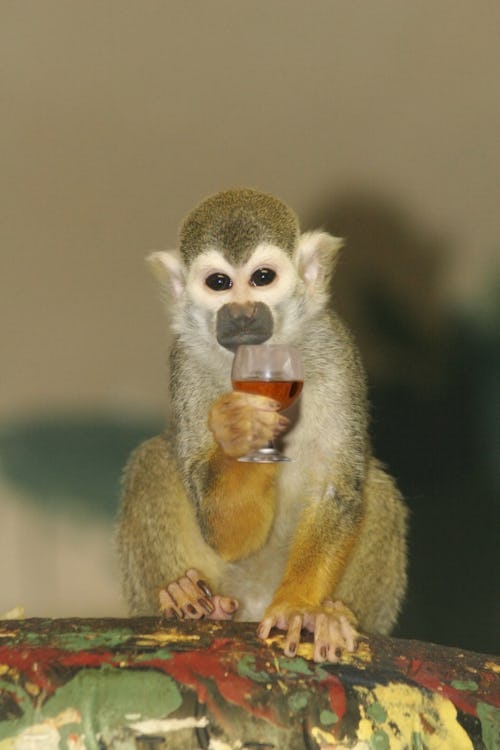These buzzed monkeys could help explain why we love drinking
Nothing explains jägerbombs, though, sorry.

If you’ve ever brunched on a Sunday, you may have wondered what it is about alcohol that folks love so much. It is, after all, kind of weird to drink the juice of grapes that have been sitting so long that they’ve actually fermented. Well, it turns out that human’s love of booze might not be a sign of sophistication or sedation — as some would have us believe. Instead, the human love of alcohol may stem from our primate roots.
A study released last month in the British medical journal Royal Society Open Science, proposes that our love of alcohol started millions of years ago when our primate ancestors learned that the scent of alcohol meant ripe fruit. In case you aren’t aware, when fruit gets very ripe, it ferments naturally and becomes alcoholic. The theory that monkeys eating fermented fruit led to our love of booze is called the “drunken monkey” hypothesis, according to EurekAlert. Researchers have been trying to prove that this hypothesis is true for decades, but this study is one of the first to back it up.
The scientists in the study followed a group of free-range black-handed spider monkeys (Ateles geoffroyi) in Panama for four months in 2013. Primatologists examined the fruit that the monkeys were eating and found that it contained between one and two percent alcohol by volume (ABV) — about as much as a low-ABV cocktail. They then analyzed the urine of the monkeys to confirm that it contained alcohol byproducts — it did.
“For the first time, we have been able to show, without a shadow of a doubt, that wild primates, with no human interference, consume fruit-containing ethanol,” Christina Campbell, a primatologist at California State University, told EurekAlert. “It looks like there may be some truth to that ‘drunken monkey’ hypothesis — that the proclivity of humans to consume alcohol stems from a deep-rooted affinity of frugivorous [fruit-eating] primates for naturally-occurring ethanol within ripe fruit,” she said.
In other words, we may like the taste of alcohol because our primate relatives evolved their senses in order to find the ripest fruit. The thing is that while it may be tempting to blame our desire for drunkenness on evolution, that’s not the situation. Ripe and fermented fruit, it turns out, is higher in calories than less ripe fruit, according to EurekAlert. So our monkey relatives weren’t trying to get lit; they were just trying to survive.
The monkeys in the study, in fact, didn’t display any kind of inebriation and scientists don’t think they feel alcohol the same way we do. "They're probably not getting drunk, because their guts are filling before they reach inebriating levels," Robert Dudley, a biologist at UC Berkeley, told EurekAlert. But it is providing some physiological benefit, Dudley told EurekAlert.
Look, the sample size in this study is really small — only six monkeys were involved — and the science is, well, a little impressionistic. But it is a fascinating take on human and primate evolution.